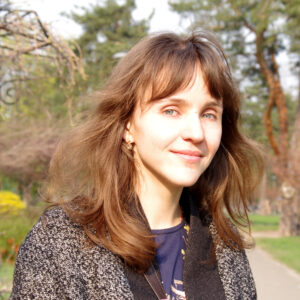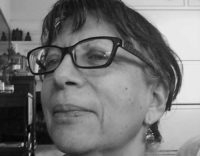Interviewed by Alberto Fraccareta
Translated from the Italian by Pina Piccolo
Iya Kiva is a young Ukrainian poet who was forced to leave her hometown Donetsk in 2014 following the outbreak of the war in the Donbas. After living in Kyiv for a period, she now resides in Lviv, where she is active as a volunteer. A bilingual Ukrainian and Russian translator and freelance journalist, Kiva has published two poetry collections: Further from Heaven (2018) and The First Page of Winter (2019). Some of her writings, featuring “a fierce analysis of the most painful aspects of visible and invisible reality as well as the consequences of war on the individual and the community” are included in the comprehensive anthology titled Poeti d’Ucraina (Poets of Ukraine), edited by Alessandro Achilli and Yaryna Grusha Possamai, and published in the Lo Specchio poetry series by Mondadori. The anthology offers a “broad overview of poetry from the 1960s to May 2022” and allows readers to glimpse the “deeply human, concrete, sanguine side of poetic writing”.
***
Could you tell us about your wartime literary work?
Today it is hard to talk about literature because, as you can see, war has the upper hand in the art of persuasion. War knows how to convince without words, in situations where words have yet to be sought. Whether they will ever be found or not, remains an open question. In the first weeks after the large-scale Russian invasion, it seemed that writing as an opportunity to interact with the world was over for me. Words appeared to be an extra appendage vis-a-vis reality, a fiery appendage that simply needed to be cut off and thrown away. However, soon after that, like so many Ukrainians, I began to have problems with concentration, memory, and the ability to think clearly: that’s when I realized that, in times like these, poetry can be not only a way of capturing an ever-shifting reality but also of setting myself within that immobilized reality.
After all, we Ukrainians—like our history—are changing ever so rapidly today that literature enables us to stop time and allow us to experience a few moments in a deeper way. I am not a prolific writer and that was the case for me even before the full-scale Russian invasion. In my opinion, words must have a weight of their own: especially when, due to war, their meanings become thinner and they slip away from your hands, like pebbles smoothed by the sea. Thus, this slowness is also the search for a language that corresponds to our new, full-blown experience of war, or rather, this utterly new and very different way we are experiencing it. And this really takes us to the task. Because words have become very literal. Since 2014, we no longer use the word ‘war’ in a figurative sense, even more so after February 24, 2022. Even the phrase ‘I am afraid’ pronounced today in Kharkiv, Mariupol, Kyiv, or Lviv corresponds to a “fear” and even an “I” that is different each time it is uttered.
It is difficult to grasp and articulate the difference between these ‘fears’. Actually, the simplification of words and, at the same time, the incredible complication of their meanings, is what comes to our mind nowadays when we consider the possibility or impossibility of writing.
Your poems touch on the topic of “internally displaced people”. Seamus Heaney also wrote about them in relation to the conflict in Northern Ireland, in the poem “Exposure” (North, 1975). Do you see any similarities?
I see some things in common between Heaney’s poems and mine because forced exile always involves a moment of admitting your helplessness in the face of circumstances, in the face of history, drawing the sum of the decisions and actions that are much more complex than the ability of an individual to influence his or her life and trajectory. Heaney’s lyric poems contain the theme of poetry as power, as an opportunity to oppose something in the world. But, if Heaney raises this question about the role of poetry, my starting point is rather the observation that making words is the only thing to do in situations where nothing else can be done. If due to military aggression, a person can be forced to leave their land, it is much more difficult to force a person to remain silent. Words can only be taken away together with the life of those who write or utter them. In any case, in the poems in some way related to the experience of internal displacement, I have sought to highlight the very fact that such reality does indeed exist. Because until 2022, the war had a local character, many people did not see it, it did not penetrate their thoughts even here in Ukraine. I wanted to tell myself and many other Ukrainians who were experiencing life as internally displaced people: “Look, we have been struck by a terrible tragedy, we are never going to be able to live as before, we will never have that sense of home again. Can’t you see that?”
In the poem Let’s Go, you mention a “pre-war Kyiv”. What memories do you have of that period?
In this poem, I write about the painful experience of my forced relocation from Donetsk to Kyiv in 2014. The realization that there is a war going on in your native plot of land, but that it is not at all experienced as such in Kyiv, causes you to constantly feel the ground giving way under your feet. At that time, I had panic attacks quite often due to my disorientation in space, my inability not only to understand where you are but also why you are there and what is happening in general. It is a poem linked to a heightened sense of alienation and exile. Therefore, the pre-war map of Kyiv that appears in this poem is a bit self-deprecating. What formally changed after 2014 wasn’t the map of Kyiv but rather that of Ukraine: it showed annexed Crimea and the temporarily occupied territories of the Donetsk and Luhans’k regions; my hometown has changed, having been turned upside down by occupation and war. The pre-war theme, then, is that of another Kyiv, which I knew as a tourist, but in which I did not have to look for a place to live, cups and spoons, winter clothes and underwear, a Kyiv in which at age thirty I did not have to start life from scratch, having neither friends nor acquaintances. Unlike that map of the city that is unaltered in its external form, that certain “inner” map of pre-war Kyiv that I held in my mind suddenly became old and unusable in 2014.
What does it mean for you to write in Ukrainian and Russian?
After February 24, I can no longer write in Russian. When I try to explain the reason, I use the expression “my tongue cannot turn”, that is, my own thoughts are unable to operate freely within the Russian language, understood as the language of poetry. I can say that the large-scale Russian military invasion has eradicated in me the ability to reflect and write in Russian—which is my mother tongue and the language of much of my life. It may seem paradoxical, but on February 24 the Russians killed my Russian language. Before that, I was explaining my writing in two languages through the metaphor of a job done using two hands. I am ambidextrous. Transitioning from one hand to the other is quite natural to me, as is bilingualism: I was still in school around the time Ukraine’s independence was proclaimed. That’s why I perceived writing in Ukrainian and Russian as a two-handed job. And even if after 2014 the Russian language became an internal problem, I still couldn’t give it up, because it would have meant amputating a good hand. Well, on February 24, 2022, that hand was amputated by missiles—I no longer write in Russian.
You are also a journalist. How does that activity differ from your way of talking about the war as a poet?
My journalistic activity is currently halted, as the war forces me to change jobs and focus on a reduced number of tasks I can perform now, which are literature and civil volunteering. However, I can answer your question. A journalistic piece to some extent excludes you, the writer, from the narrative as an evaluative subject, because your job is to show the Other as if he or she were speaking for themselves. Every journalist is a sort of director who allows the person reported on to express themselves, refrains from playing the role for this person, and does not invent jokes for him or her, at least not in full. While in literature all words are the words of the author.
This is also the case with prose, which usually deals with characters. If we refer specifically to the history of war, then the difference is that poetry (and consider that I am first and foremost a poet) answers the question “how are we living in these times?”, that is, poetry gives back to people the ability to express emotions, looks for the exact words for them. Whereas journalism answers the question “what are we experiencing now?”, because during a war reality changes with such frequency and speed that it is impossible to understand it. War seems to increase the breadth of reality to a much greater extent than we previously knew. Therefore, war reporters work primarily as evidence collectors and archivists of the times whereas poetry tries to capture the moment in its emotional fullness, realizing that tomorrow an event may happen, another act of genocide may occur, that takes away your very ability to speak.
The above interview, originally in Italian, was first published by the Italian newspaper Il manifesto on October 12, 2022.
Also, read a Bengali story by Premendra Mitra translated into English by Upasya Mukherjee, and published in The Antonym:
Follow The Antonym’s Facebook page and Instagram account for more content and exciting updates.



























0 Comments